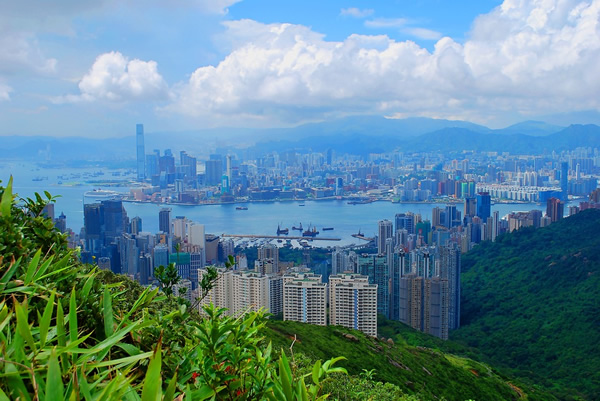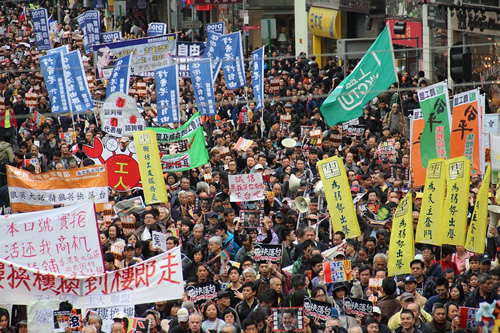Living in Hong Kong: The International Hybrid
By Micah Stover

|
|
Hong Kong skyline.
|
“We travel, initially, to lose ourselves; and we travel, next, to find ourselves.” — Pico Iyer.
Hong Kong. An island. A metropolis. A cluttered mass. Varied landscapes. Urban beauty. Fantasy in flesh and form.
Or so it was for me. I remember the first day I landed there, weary and shell shocked from thirty plus hours of transiting.
Having spent a summer as a student in mainland China, I had decided there was more for me to discover in Asia. So, I accepted a job in Hong Kong and three months later the journey began.
When flying into Hong Kong, your plane actually lands on a separate island called Lantau. From Lantau Island, there are innumerable ways to get to the city — by taxi, by bus, by train, by boat. Fortunately the university where I was to begin working the next week had emailed me detailed instructions (in English and Chinese) so that I would know how to get to my new home. I was to take the green taxi, show him the business card of the university and prepare myself for another hour of transit. Simple. Right?
The airport, like much of Hong Kong, as I would soon discover looked freshly sanitized and almost damp with humidity. I saw a Starbucks and then a 7-11. I saw nearly as many foreigners as I did Chinese people. And for a moment, I wondered if I’d actually made it to the right place. Where did the west end and China begin?
Outside the doors of the airport. I looked for the green taxis. I found one and attempted to exchange pleasantries with the driver who spoke about as much English as I did Cantonese. He put my bags in the back and we were off.
Hong Kong revealing her form to me, through the windows of the taxi. Immovable mountains created the borders of the canvas, and in between the mountains were bodies of water, filled with small fishing dinghies. Clouds rested atop the mountains making it hard to see where the flesh of earth stopped and heaven started. The landscape itself was like yin and yang. Hard and soft. Resilient and permeable.
The sun was just beginning to rise through the clouds, and the sky was a muted pink and orange glow. The taxi driver had a small Buddha statue on his dashboard and the radio was playing traditional Chinese music. Occasionally our eyes would meet in the rearview mirror and both of us would smile, as if sharing a secret.
Every so often, we would round a corner and there would be rows upon rows of high rise buildings, and I would think to myself — this must be it, the big city. Of course, it was not. The skyline of Hong Kong is incomparable, haunting and inspiring. Once you’ve seen it, everything else is measured against it.
Finally we arrived at my new home, my new work, my new life. A little Chinese guard, all smiles and enthusiasm greeted me at the gate and took me to my new flat. Small, modest, clean. I sat down on the little twin bed, hard as stone, looked at my bags around my feet and didn’t know whether to cry or laugh out loud. I did both.
You see this is how it is with travel. And this is why travel is not just necessary, but soul saving. It deconstructs everything, forcing you to build again, to redefine not only yourself but the entire world around you. And in this way it saves you from the monotony and emptiness of superficiality, complacency and comfort.
Everyday of my life in Hong Kong was a discovery. Even after three years of being there and having learned my way around the city and a fair amount of the language, there was always something new to see or do. Almost like being a kid again, when the world is so large and unknown. Everyday is a kind of rebirth, a perfect illusion of being young forever.

|
|
Hong Kong New Year celebration.
|
What I came to understand and love most about Hong Kong over time, what makes it perhaps so beautiful is that it is a perfect hybrid. In ten minutes time and the distance of walking four blocks, you can brush up against countless generations and adaptations of identity. On one street corner, the old man sweeps the stoop of his stall with a straw broom. The heat is sweltering and he’s wearing an almost transparent white tank top, suspenders and worn out trousers. He holds a cigarette between his lips and smiles at me as I approach. This is all the invitation I need to stop. It is not the stuff of his shop that beckons me in. It is him, the living character, an artifact of another time, still totally at home in the entropy around him. I know without us speaking that he has lived unimaginable things, that he is history in the flesh standing before me. And I want him to tell me countless stories.
“Na Ho (hello)” I say and smile.
“Ah, lai sic Guandongua (You speak Cantonese?) Very Good.” He chuckles.
I buy a satin pouch to send home to my mother. I thank him and step back out into the street, an entirely different scene.
I’ve been at the beach, a place called Sai Kung. I am covered in sand, sweaty, salty and tan. I feel good like this, beautiful, powerful, free. You remember things when you’re living in a foreign country. Little things, like how many stairs you have to walk before you turn on the little alley down the right to the small bar with white Christmas tree lights. The bar called Gecko. Little things you remember. I remember that day, that ferry ride, that tiny, tan beach.
As I said Hong Kong is a hybrid. It is not one or the other. It is everything mixed together. It is not Chinese. It is not English. It is both, and neither. Hong Kong is like a racing pulse, pumping adrenalin, speeding up time. It is a city to be lived somewhat recklessly, pulling the very fibers out of each minute. It happens fast, leaving you longing for more even before you’ve left.
Such is the spirit of Hong Kong, the juxtaposition of past and present, of tradition and change. The embodiment and symmetry of a perfect paradox. I went to a seminar once at one of the local universities to hear this very famous Chinese poet reading his work. The final part of his reading was a collection of poems about Hong Kong. In one of them he said, “Hong Kong is a female in labor, writhing and beautiful.”
There is no singular story to depict Hong Kong. It resists definition, plowing deeper into the postmodern. It is a video game of something ancient. It is a story waiting for you to write your version. It is a gracious city, like her god, Guilin, giving freely and without expectation.
The only thing asked of the traveler is that you live. That you try everything. That you find yourself in an Asian noodle house at 4 am. That you make your offering at the temple of existence. That you dine atop of a one hundred story building. That you ride a ferry to some small island. That you learn to play mah jong. That you sing Madonna at seedy Karaoke bar. Most importantly, that you shed your illusions. Of yourself. And of what you assume otherness to be.
Hong Kong invites you to the future.
|
